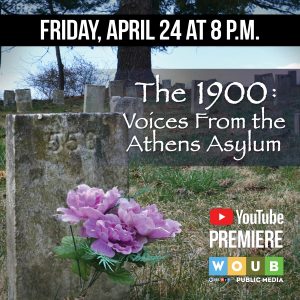Communiqué
Watch The 1900: Voices from the Athens Asylum on YouTube
< < Back toDocumentaries will be released each Friday at 8 p.m.
ATHENS, OH – WOUB Public Media continues its YouTube release of locally-produced documentaries this week, as Ohioans are staying at home and following the directive of Ohio Governor Mike DeWine and Ohio Department of Health Director Doctor Amy Acton to fight the spread of COVID-19. On Friday, April 24 at 8 p.m., WOUB is releasing The 1900: Voices From the Athens Asylum. The documentaries will remain posted on YouTube for one week after their release.
|
The 1900 YouTube Premiere Friday, April 17 8 p.m. https://bit.ly/The1900 |
“I was inspired to work on this documentary after I experienced mental illness personally,” said WOUB Community Engagement Manager Cheri Russo, who produced and wrote the documentary. “After having children and suffering from Postpartum Depression, I learned the story of a woman buried in one of the cemeteries at the asylum who also had Postpartum, and I needed to tell her story.”
The hour-long documentary tells the story of how patients landed at the psychiatric hospital in Athens, now known as The Ridges, and how a group of people helped identify those patients buried under numbered graves.
“Learning about and telling the stories of the patients who were buried under the numbered tombstones at the asylum is really important because they were people who were not claimed by their families when they died,” said Russo. “They were forgotten about and didn’t have the dignity of being buried with a tombstone that identified them by name. I feel the work we did on this documentary helped in a small way to rectify that for those patients and their families.”
“The stories we were able to tell made you realize that these were real people with real issues that brought them to the asylum in the first place,” said WOUB Producer/Director Evan Shaw, who was a videographer and editor of The 1900. “We used voice actors in the documentary to allow the patients to tell their story in the first person, which gave the patients a voice in the telling of their own story, a voice that hadn’t been heard for decades.”


